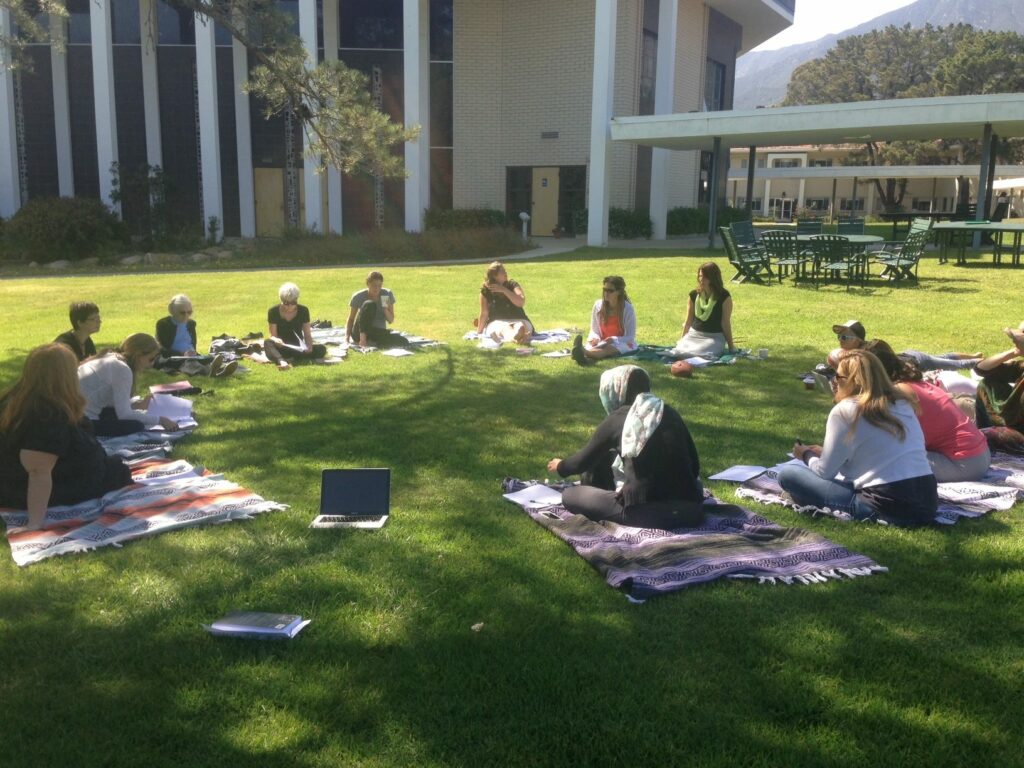What is Spiritual Direction?
When I first heard the term “spiritual direction”, I felt put off. It sounds like agreeing to a relationship in which someone tells you what to do with your spirituality. Isn’t there enough of that in the world? And haven’t such systems faltered under the weight of hierarchical power structures? Even in their absence we find far too many examples of individuals gone rogue, posing as teachers, gurus or worse. No thanks. That’s why, much to my surprise, I am currently enrolled in a Spiritual Direction program. Halfway through, in fact. How did this happen? It was a convergence of three different paths. Let me explain.
What it is Not
Some brief clarification: Most spiritual directors share my disdain for that term. “It’s more like ‘spiritual companioning’”, I’ve heard them say. What this means (in its ideal form) is a professional who holds space for spiritual questing, suffering, loss and growth without an agenda, script or dogmatic protocol. It is not confession, repentance, supervision, or sermonizing. Now that sounds more like it. So how does that apply to my professional work at Salt City Bodyworks?
Not All Suffering Comes from Trauma
First, I’m increasingly aware that not all suffering comes from unresolved trauma. This isn’t news. In recent years, however, I have seen it more and “more in my private practice. Many of my clients suffer loss, isolation, betrayal or sudden growth and there isn’t anything to be “done” about it. In other words, the pain inherent in these experiences is simply because they are painful. What makes the suffering bearable (or even meaningful) is when it’s presenced by another individual. Historically, clergy have filled that role. But in an ever more secular world, people turn to professionals for this support. Spiritual directors are chief among them.
Post Traumatic Growth
Second, a good portion of my clients are in the “post traumatic growth” stage of their trauma healing. What is that? Post traumatic growth is “positive psychological changes experienced as a result of the struggle with trauma or highly challenging situations”. These changes aren’t just psychological—they are social, physiological and spiritual, too. With training in spiritual direction, I can offer better support where spiritual growth is concerned.
Limitations of a Purely Somatic Approach
Finally, I recently experienced some traumatic events for which somatic support was only partially helpful. Admitting this brought me to an uncomfortable edge for obvious reasons. Part of that realization included a sense that returning to my spiritual roots would bring additional healing. But with a personal history marked by religious trauma, this would be no small undertaking. Spiritual direction training is in part for professional reasons, to be sure. It is also clear that I am hoping for personal benefit as well. With another year left in my training, I await to see the opportunities it brings to both.
Is Spiritual Support for Everyone?
What about atheist or agnostic clients? Is spiritual direction optional in somatic trauma healing? Is it non-denominational? Salt City Bodyworks offers services to people along a broad spectrum of worldviews and spiritual orientation. Spiritual support and exploration are available for those clients who choose it. To learn more about which approach is right for you, click here to schedule a consultation
How I Got Into Somatics
Most “helping professionals” come into their careers by searching for answers to their own issues. I’m no exception. I grew up in a religious culture that put me at odds with my body. So when I had my first massage, a new world opened to me. I connected to my physical self through touch in a way that felt safe, healthy, and nourishing. From then on I was hooked. I enrolled in massage therapy school but through life’s twists and turns, I didn’t actually get licensed for ten more years.
Massage Therapy
As a massage therapist, it wasn’t long before I became aware of the different kinds of pain my clients experienced in their bodies. Some of it was straight forward. I could link it to things like repetitive use, postural misalignment or injury rehabilitation. Quite often, however, my clients had physical pain with no apparent cause. Moreover, they reported feeling the pain in their muscles yet it remained elusive to pinpoint. I believed their experiences were real, so then where was this pain coming from?
I didn’t know it then, but that question ultimately led me into the field of somatic (or “body”) psychology. Its focus is on how psychological, emotional or spiritual experience manifests in the physical body. A common example that showed up on my massage table were tight shoulders from chronic stress.
Somatic Psychology
I started Pacifica Graduate Institute’s graduate program in somatic psychology in the fall of 2012. I chose this unique program because I wouldn’t come out on the other side as a licensed mental health care professional. This was perfect for me. I didn’t want to become a psychotherapist—I wanted to be a somatic practitioner. That meant I could keep the emphasis of my work on the body, not the mind. I knew I was taking a chance because (as is true today) there is no licensure tract to become a somatic therapist. There would be no guaranteed work placement come graduation. I followed my heart anyway and graduated in 2014.
To make a long story short, it was during my studies that I figured out the most likely source of my massage clients’ pain: accumulated stress and unresolved trauma. Both cause dysregulation in the autonomic nervous system. Dysregulation generates all sorts of physical issues—chronic muscle tension being just one.

Somatic Trauma Healing
After grad school, I decided to get more specific training in somatic trauma healing. In 2017 I became a Somatic Experiencing Practitioner and in 2019, a professional in the NeuroAffective Relational Model (NARM). My private practice slowly grew from offering only massage therapy to what I do today: somatic trauma healing. To learn more or to find out if a somatic approach is right for you, click here to schedule a consultation.




